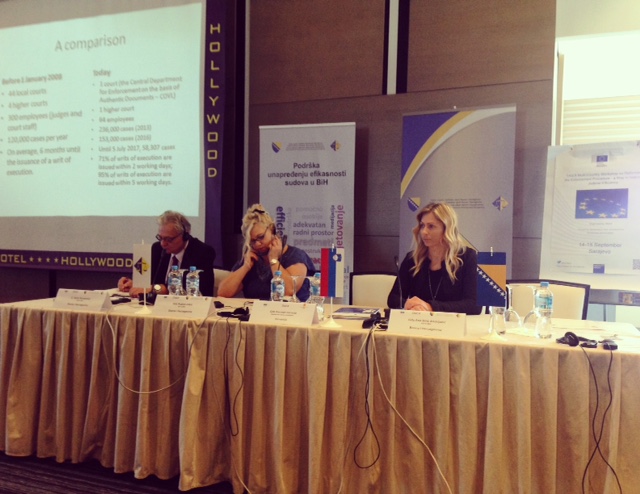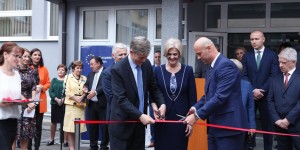A two-day TAIEX Multi-Country Workshop on “Reforming the Enforcement Procedure – a Way to Improve Judicial Efficiency” ended today in Sarajevo. The workshop was organised by the High Judicial and Prosecutorial Council of BiH (HJPC BiH) in cooperation with the European Commission’s Directorate General for Enlargement through Technical Assistance and Information Exchange Instrument (TAIEX).
The aim of the workshop was to provide an opportunity for an exchange of experiences and presentation of the best practices from the Region and the member states of the European Union in improving judicial enforcement procedure. The special focus was on reducing the utility cases backlog (small value disputes arising from unpaid bills for using public utility services such as electricity, water, heating, garbage collection).
Through presentations of international and domestic experts, having in mind the number of such cases that are clogging the judicial system of Bosnia and Herzegovina, the participants attempted to identify the best sustainable solutions for strengthening the enforcement of unpaid utility bills, i.e. improving the court enforcement procedure.
The conference was opened by Ružica Jukić, the Vice President of the HJPC BiH and Richard Wood, Head of the Rule of Law Section at the EU Delegation to BiH and EU Special Representative in BiH.
“Considering the modalities and proposing initiatives to unclog the judicial institutions by removing some of the proceedings and conveying some of the competencies is one of the HJPC’s activities which is consistent with the recommendations of the European Commission for the implementation of the Justice Sector Reform Strategy in BiH and the Structured Dialogue on Justice”, Vice President Jukić said. She added: “The HJPC BiH has taken many activities to reduce the number of utility cases. One of the most important ones is the introduction of the System for Electronic Filing and Processing of Small Value Cases, the so-called utility cases (SOKOP). With the aim of reducing the utility cases backlog, more cost-effective processing of cases, creating a database and introducing a unified way of processing, the SOKOP system is mandatory in all courts in BiH“.
Vice President Jukić reminded that in the “Analysis of legislative amendments required for the removal of utility/enforceable cases from courts by setting up public or private agencies”, the HJPC BiH has identified the most acceptable model. She referred to the HJPC BiH conclusions that the efficiency of enforcement procedure may be improved and increased by transferring some judicial competencies in the enforcement procedure to the institutions outside the judicial system by setting up private agencies or introducing private bailiffs in the debt collection stage.
“Given the fact that the nature of the problem arises primarily from social and economic inadequacies rather than judicial set up, there is a need to explore non-judicial responses alongside with reform of enforcement procedure laws”, Richard Wood pointed out.
Experts from Croatia and Slovenia presented the EU model of Enforcement Procedure Reform (experiences, pros and cons) and main problems faced by utility companies when attempting debit collection through court proceedings. Models of enforcement procedure in use in the region, Serbia, the Former Yugoslav Republic of Macedonia and Bosnia and Herzegovina were also discussed.
Work Bank Experts also attended the workshop and presented the expert report on good practices in utility bill backlog reduction titled “Towards Effective Enforcement of Uncontested Claims”.
Participants had an opportunity to take part in the practical session of the workshop and give their proposals and suggestions for improving the current enforcement procedure with a special focus on utility cases.
For more information, please contact:
Cabinet of the HJPC BiH Presidency
Tel.: 033 707 570;




